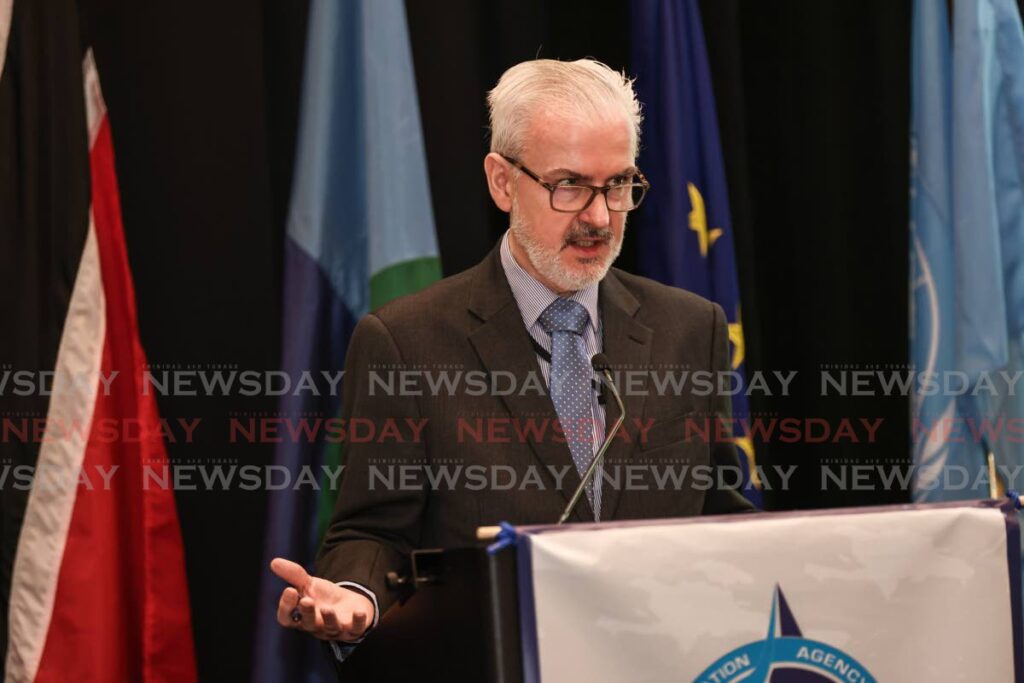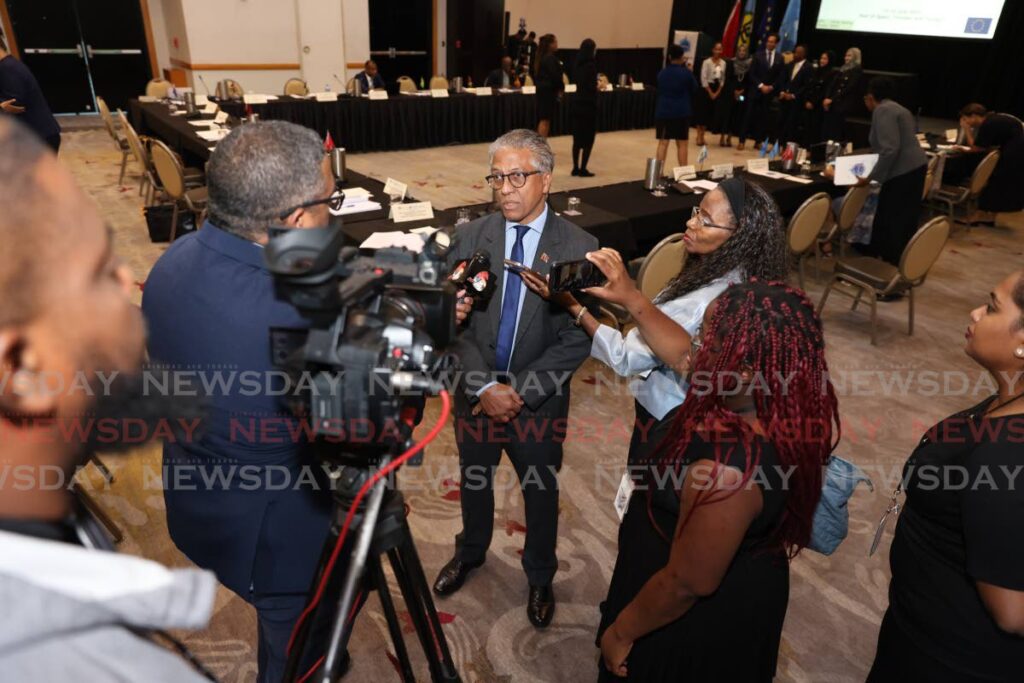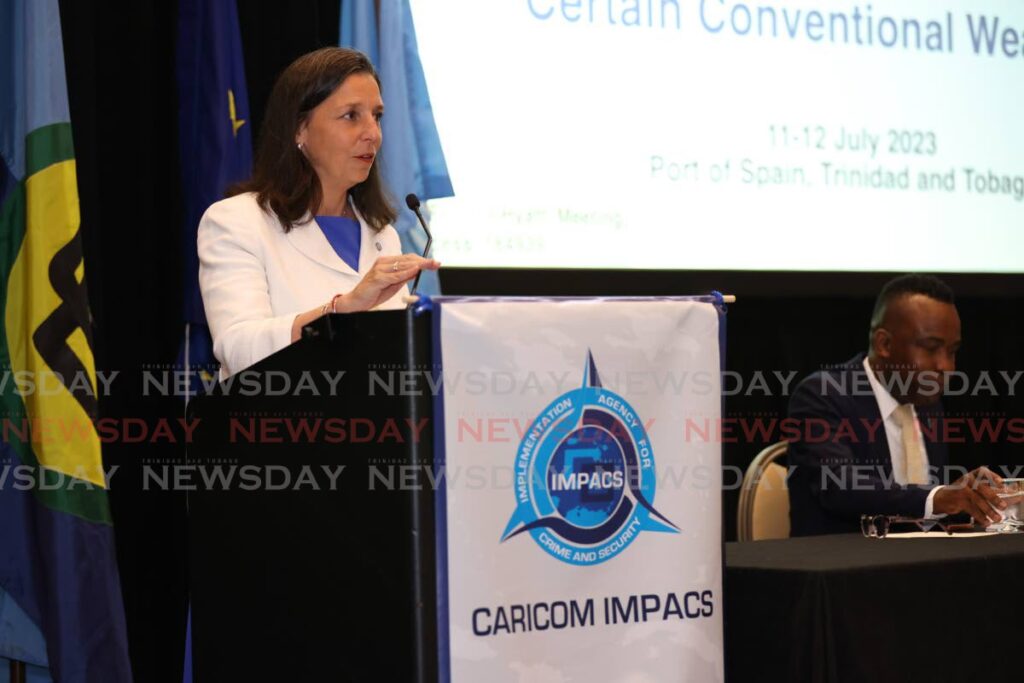Caricom to discuss risks of lethal autonomous weapons

FOR two days, discussions will be held on the use of and threats associated with lethal autonomous weapons in the region and how it should be addressed.
Attorney General Reginald Armour, SC, believes "the present is the future," and so Caricom must not hesitate in its preparations in dealing with these risks
From Tuesday-Wednesday, TT will host the Caricom Regional Workshop on Achieving the Universalization of the Convention on Certain Conventional Weapons.
It is being held at the Hyatt Regency, Port of Spain.
During his main speech, Armour said the region is not immune to the potential risks posed by the development and deployment of autonomous weapons.
"It is, therefore, our duty to come together as we are doing now and, in fact, to build off of the solid security foundation laid thus far by maximising this opportunity to exchange knowledge and to collaborate on finding solutions that protect our societies and uphold universal humanitarian principles."
He said striking the right balance between harnessing the benefits of technology and upholding commitments to human rights and international law is an "intricate challenge."
He said it requires collective wisdom and collaboration.
"Having a collective position on the adherence to the provisions of the majority of multilateral disarmament and arms control treaties is a long-standing paragon tradition. It serves as a demonstration of our well-established commitment to a rules-based regime governing the international relations among states.
"As Caricom member states, we have committed and have already demonstrated our endeavours in strengthening the efforts to address the issue of lethal autonomous weapons systems."
He said Caricom has the opportunity to lead by example and to be at the forefront of international efforts on this topic.
"As we deliberate here over the next two days, let us remember that the decisions we make here will have far-reaching consequences not only for our region but for the entire world. I call on all participants present today to use this forum which provides a significant opportunity to start the discussions with your respective governments on the issues raised."

Speaking to reporters after the ceremony, he said the region cannot simply wait to react to such threats "because in the reactive mode, we are not going to catch up. We have to take in front.
"This is very important to recognise that this is a clear and present danger that we have to begin to recognise and provide legislation and regulations for, so that if and when we have to deal with a problem that emerges, we are prepared for it.
"You have a piece of equipment out in the sky coming at you and there's (no one) managing it, but they can be weapons and lethal weapons.
"When they're managed by algorithms, they're not going to – as they target you and they see a child running across, there's no human capacity to stop. Autonomous weapons geared to kill without human intervention have to be very seriously recognised as something that we need to manage."
Lt Colonel Michael Jones, executive director of Caricom Impacs, said the world is rapidly changing and technologies such as artificial intelligence (AI) are "quickly growing and expanding, transforming all areas of society, including advances in weapon technologies."
He said such weapon technologies may have "detrimental implications" for the maintenance of peace and security as well as the protection of civilians and civil infrastructure.
This, he said, raises questions about the sufficiency of existent government frameworks and the proliferation of such weapons to non-State actors.
"Criminal groups, gangs and terrorists, disarmament, non-proliferation and arms control policies pay active attention to emerging technologies and their implications.
"So akin to how trade differences have spawned a rise in the manufacturing of privately made firearms and autonomous parts, so too with AI and robotics are revolutionising law enforcement, security, conflicts, warfare and weapon systems, including the emergence of lethal autonomous weapon systems, that is, machines which, once activated, can identify, engage, and destroy targets on their own without further intervention by a human operator."
He, too, underscored that the lack of human control in the decision-making processes of these weapons raises "significant legal, ethical and moral concerns."
He said it also "questions the conformity of these weapons with applicable international humanitarian or international human rights law, and the issues of accountability and responsibility in the event of civilian murder or other unintended consequences."
He said an international, legal framework is essential to address this.
"A critical format which lethal autonomous weapon systems are mainly addressed is the Convention on Certified Action Weapons (CCW).
"The challenge is that only four Caribbean member states are high-contracting parties to the CCW. Moreover, since the CCW and the evaluation process commenced in Geneva in 2014, only one Caribbean high-contracting party of the CCW, of one Caribbean observer state, has attended a CCW conference regarding lethal autonomous weapon systems.
"Hence, our voices are not heard, our views are not considered, and our perspectives are not part of the conversation, nor are our needs or ideas addressed in discussions relating to lethal autonomous weapon systems."
He said the perspectives of small-island developing states will add value to these discussions so Caribbean countries "have a seat at the table.
"For our interest to be factored into national instruments, we must be active players in the discussions of the rule. Therefore, my key aim of this workshop is to support states that are not part of the UN CCW to gain a more in-depth understanding of the purpose and function of the convention, as well as the benefits of joining, and to encourage them to become more involved in CCW meetings, relevant activities, and other related regional and global forums."
He said the region needs to enhance its shared awareness and technical literacy of all AI technologies.

Carolyne-Melanie Regimbal, chief of service at the UN's Office for Disarmament Affairs' Geneva office, said the Caribbean is free of nuclear weapons and a zone of peace.
"We hope by the end of this workshop we will have convinced many more of you to join us in this very important endeavour. We hope that this event will be a valuable opportunity to exchange on the convention, to share lessons learned and to develop a better understanding of a comprehensive national interpretation of the CCW and to discuss central topics to the convention and their relevance to the region."
She said the international security landscape poses "an increasingly complex, multidimensional challenge occurring against the backdrop of global erosion of trust in multilateral systems.
"Now more than ever, we must reiterate our supportive effect to multilateralism in order to ensure a safer and more sustainable world that puts humans at its centre."
Peter Cavendish, ambassador extraordinary and plenipotentiary of the European Union delegation, reminded those present that in 2018, the European Parliament passed a resolution calling for an international ban on lethal autonomous weapon systems.
"More recently, Joseph Borrell, the high representative of the EU for Foreign Affairs and Security, has remarked and encouraged...the EU institutions and the EU delegations to do three things: to help them out, to set out, to follow the main trends and forces that are shaping the world and know what to do.
"To understand that we are partners, we need to develop a broad approach to security and that we need to get the balance right. We have to protect our interests but also the interests of our partners."
He said the Caribbean has a very powerful voice.
"I anticipate and look forward to the many issues that have been raised by Caricom nations and by Latin American nations at this very important summit.
"The voice of the Caribbean is at the forefront. You have a very valuable track record and great opportunities to work with the EU for our joint interest."


Comments
"Caricom to discuss risks of lethal autonomous weapons"